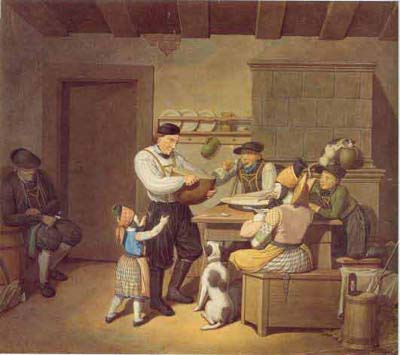 |
[ZAWiW] [gemeinsamlernen] [LiLL] | ||
|
|
|
|
| home | ||
|
|
Introduction | |
|
|
Questionnaire | |
|
|
Result Analysis | |
 |
||
Result Analysis
Stand:| a: What value does bread have in a person's life?
Bread is integrated into customs and traditions. In our daily life and on festive occasions we meet bread in many different presentations. For the majority of the questioned people, bread plays an important role in their lives. The religious background in their attitude towards bread as being reciprocal especially in the Christian religion. As it has always been regarded as valuable food, it is also regarded as a symbol of community and spiritual nourishment, and for some people it even means "Bread is holy." (The Last Supper, Eucharist).At the same time it is a symbol of Christ's body. On the other hand it establishes as daily food a connection between the life of the faithful and their religion. |
 |
| Bread is THE staple of life. | G.E. Opitz, Bauernfamilie, um 1830, DBM |
The value of which is a basic factor in Germany, especially after war time. The consumption of bread is considered to be highly valuable for one's health, particularly its fibre because of its effect on the stomach and the intestines and because it contains minerals and vitamins. After the war bread exchanges were created in order to get bread for the family's existence. High value items such as furs, jewlery, carpets, clothes etc. were exchanged disproportionately for bread.
Quotations:
"We cannot do without our daily bread, it contains
vital substances."
"Bread has been a decisive factor for the cultural development of
man."
"Bread is simply a part of a good life."
Bild: G.E. Opitz, Bauernfamilie, um 1830, DBM
b: Do you think that one
can have a good life without bread?
For the majority of the people interviewed, it is
inconceivable to live without bread. A smaller group thought that, in principle,
it might be possible. Several people were of the opinion that the majority of
mankind outside Europe lives on rice and /or corn and not on cereals.
Quotations:
"There are cultures that live well without bread,
such as China and Japan, but I personally can't imagine living without bread."
"Altogether more people in the world live from rice than from bread."
"For us in Europe bread plays an important role because it is nourishing,
tasty and wholesome."
Summary:
Bread plays and important role to the to human existence and nutrition. Religious and cultural factors increase the value of bread.
